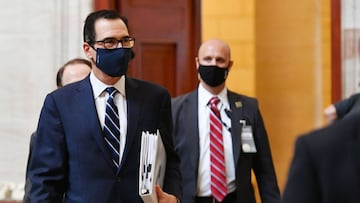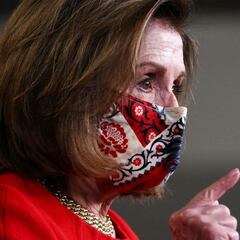$600 stimulus check but lower unemployment benefits: what’s in the new White House proposal?
Mnuchin has spoken to Pelosi about a new covid-19 relief package which would provide another round of direct payments, but would see millions of Americans go without additional unemployment support.


A new financial package proposed by Treasury Secretary Steven Mnuchin has reignited the possibility of a second round of stimulus payments for struggling Americans. Congress has been unable to agree on a second, large-scale covid-19 relief bill since the CARES Act was signed into law on 27 March, which included $1,200 stimulus checks for anyone earning less that $100,000.
Since then, the Republican-led Senate have been unwilling to pass a major bill which contains provision for another wave of direct payments, but Mnuchin has privately tabled a new package that may find more support. Exact details have not yet been announced but House Republican leader Kevin McCarthy said in an interview that this new deal is “a much better product” and includes a $600 direct payment for each qualifying adult, with an additional $600 per child. For a family of four, this would represent a $2,400 financial boost.
McCarthy says he and McConnell back inclusion of $600 stimulus checks in a coronavirus relief package https://t.co/foGa0RO7rM pic.twitter.com/NPH0nNfUbD
— The Hill (@thehill) December 9, 2020
Mnuchin proposes new $916bn package with support from key Republican figures
Since Election Day, now over a month ago, there had been little sign that the White House was interesting in negotiating a new deal as their doomed election litigation consumed the focus. However on Tuesday Mnuchin spoke to Speaker of the House Nancy Pelosi to propose a $916 billion package, with the backing of the White House, McCarthy and Senate Majority Leader Mitch McConnell. It appears to be a response to the $908 billion bill tabled by a bipartisan group of lawmakers recently. However while that did not include any direct payments, the one proposed by Mnuchin offers another round of stimulus checks.
.@senatemajldr, it's great to hear you say ''compromise is within reach'' on a COVID-19 deal, but Americans need COVID relief now. This is no time to leave Americans out in the cold. The $908 billion offer by a bipartisan Senate group is a great place to start #LetCongressVote
— Governor Christine Todd Whitman (@GovCTW) December 9, 2020
The deal has the blessing of President Trump which will be crucial if Americans are to receive more financial relief before President-elect Joe Biden is sworn in on 20 January 2021. All involved in the negotiations have said publically that they want a new package to be signed before Congress breaks for Christmas at the end of next week but are split on the size of financial support needed. Pelosi had been determined to keep the $2.2 trillion HEROES Act intact but McConnell does not believe a large package is required, favouring a ‘skinny bill’ instead.
How would this affect unemployment benefits?
One of the most pressing issues at the moment is unemployment benefits for those affected by the pandemic. The CARES Act provided an additional $600 of weekly payments for those currently out of work but that funding expires on 26 December, affecting 12 million people.
Twitter CEO Jack Dorsey donated $15M to universal basic income programs in 30 U.S. cities. Cities will choose monthly payments for families in need — up to $500/month in some.
— AJ+ (@ajplus) December 9, 2020
12 million people are expected to lose federal unemployment benefits at the end of December. pic.twitter.com/BSsnG5dKVy
The bipartisan framework released last week set aside $180 billion in federal unemployment benefits to replace the funding that will soon expire, but even this was only enough to provide a $300 weekly payment for out-of-work Americans. The HEROES Act would see the $600 amount continued but McConnell has refused to even consider a package on that scale.
The plan submitted by Mnuchin on Tuesday included just $40 billion in unemployment funding, which may make it a non-starter amongst House Democrats who would also need to pass the proposal. In a joint statement, Pelosi and Senate Minority Leader Charles Schumer said that the cuts to unemployment benefits were unacceptable.
- Newsmax expansion on Trump support and against Fox News
- Could I get a new stimulus check before new year?
- When will Senate vote on new $908 bn stimulus bill?
- Second stimulus check: Biden's 'hundreds of billions' in relief
Related stories
“The bipartisan talks are the best hope for a bipartisan solution,” the statement said. “The President’s proposal starts by cutting the unemployment insurance proposal being discussed by bipartisan Members of the House and Senate from $180 billion to $40 billion. That is unacceptable.”
Another round of direct payments would certainly be a popular move but unemployment benefits are considered a priority by Democrats as the recovery of the US job market continues to stall. Currently there are nearly 15 million out-of-work Americans, with nearly four million reporting being out of work for over six months. With some projections suggesting that the US economy may not return to its pre-pandemic state until March 2024, there is a real danger that federal funding will not be able to keep up with the demand.

